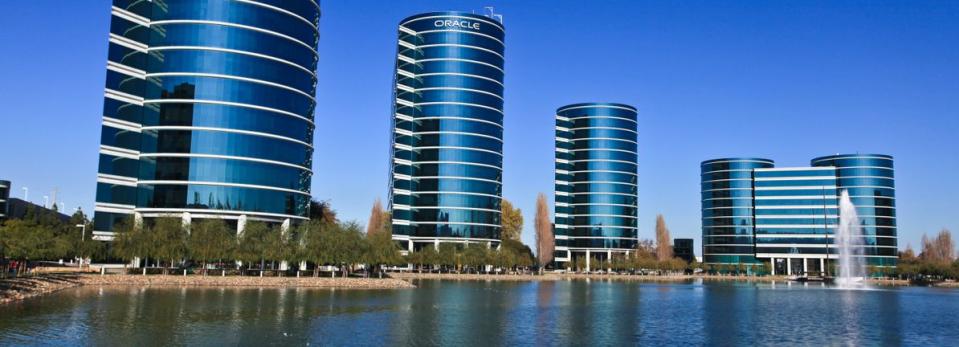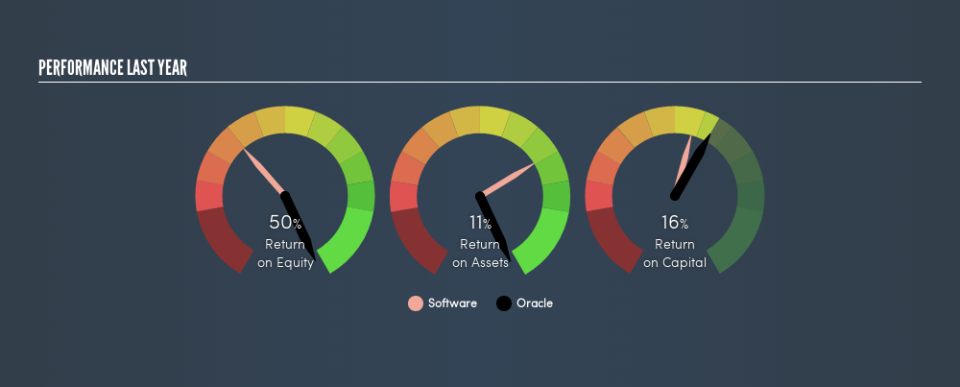Oracle Corporation (NYSE:ORCL) Earns Among The Best Returns In Its Industry

Today we'll look at Oracle Corporation (NYSE:ORCL) and reflect on its potential as an investment. Specifically, we'll consider its Return On Capital Employed (ROCE), since that will give us an insight into how efficiently the business can generate profits from the capital it requires.
First up, we'll look at what ROCE is and how we calculate it. Next, we'll compare it to others in its industry. Then we'll determine how its current liabilities are affecting its ROCE.
Return On Capital Employed (ROCE): What is it?
ROCE is a metric for evaluating how much pre-tax income (in percentage terms) a company earns on the capital invested in its business. All else being equal, a better business will have a higher ROCE. Ultimately, it is a useful but imperfect metric. Renowned investment researcher Michael Mauboussin has suggested that a high ROCE can indicate that 'one dollar invested in the company generates value of more than one dollar'.
So, How Do We Calculate ROCE?
Analysts use this formula to calculate return on capital employed:
Return on Capital Employed = Earnings Before Interest and Tax (EBIT) ÷ (Total Assets - Current Liabilities)
Or for Oracle:
0.16 = US$14b ÷ (US$109b - US$19b) (Based on the trailing twelve months to May 2019.)
So, Oracle has an ROCE of 16%.
View our latest analysis for Oracle
Is Oracle's ROCE Good?
One way to assess ROCE is to compare similar companies. In our analysis, Oracle's ROCE is meaningfully higher than the 9.4% average in the Software industry. I think that's good to see, since it implies the company is better than other companies at making the most of its capital. Separate from Oracle's performance relative to its industry, its ROCE in absolute terms looks satisfactory, and it may be worth researching in more depth.
The image below shows how Oracle's ROCE compares to its industry, and you can click it to see more detail on its past growth.
Remember that this metric is backwards looking - it shows what has happened in the past, and does not accurately predict the future. ROCE can be misleading for companies in cyclical industries, with returns looking impressive during the boom times, but very weak during the busts. ROCE is, after all, simply a snap shot of a single year. Since the future is so important for investors, you should check out our free report on analyst forecasts for Oracle.
Do Oracle's Current Liabilities Skew Its ROCE?
Current liabilities are short term bills and invoices that need to be paid in 12 months or less. Due to the way ROCE is calculated, a high level of current liabilities makes a company look as though it has less capital employed, and thus can (sometimes unfairly) boost the ROCE. To counter this, investors can check if a company has high current liabilities relative to total assets.
Oracle has total liabilities of US$19b and total assets of US$109b. Therefore its current liabilities are equivalent to approximately 17% of its total assets. Low current liabilities are not boosting the ROCE too much.
Our Take On Oracle's ROCE
This is good to see, and with a sound ROCE, Oracle could be worth a closer look. Oracle looks strong on this analysis, but there are plenty of other companies that could be a good opportunity . Here is a free list of companies growing earnings rapidly.
If you like to buy stocks alongside management, then you might just love this free list of companies. (Hint: insiders have been buying them).
We aim to bring you long-term focused research analysis driven by fundamental data. Note that our analysis may not factor in the latest price-sensitive company announcements or qualitative material.
If you spot an error that warrants correction, please contact the editor at editorial-team@simplywallst.com. This article by Simply Wall St is general in nature. It does not constitute a recommendation to buy or sell any stock, and does not take account of your objectives, or your financial situation. Simply Wall St has no position in the stocks mentioned. Thank you for reading.

